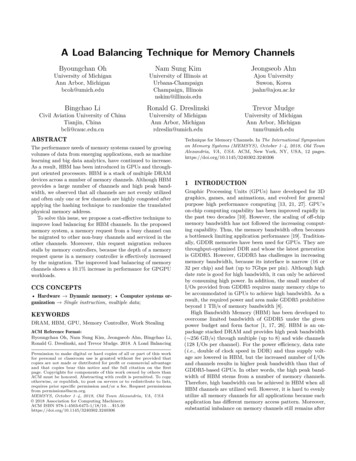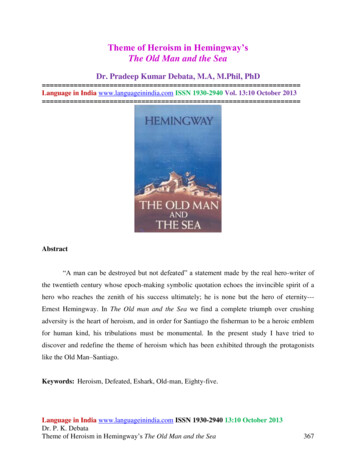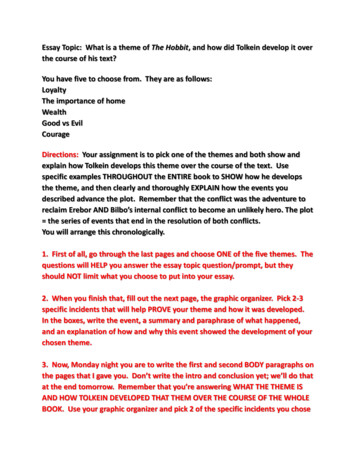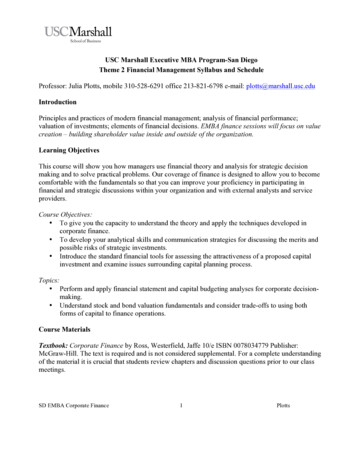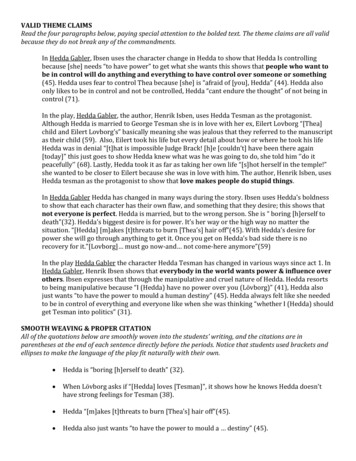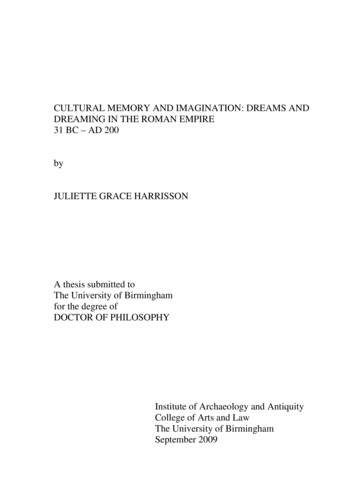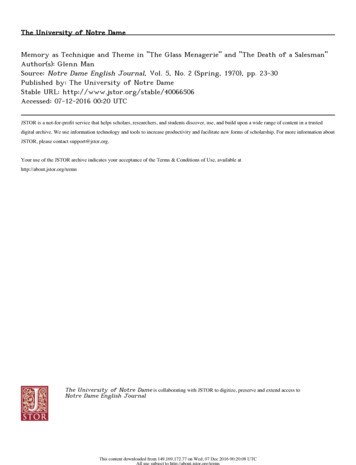
Transcription
The University of Notre DameMemory as Technique and Theme in "The Glass Menagerie" and "The Death of a Salesman"Author(s): Glenn ManSource: Notre Dame English Journal, Vol. 5, No. 2 (Spring, 1970), pp. 23-30Published by: The University of Notre DameStable URL: http://www.jstor.org/stable/40066506Accessed: 07-12-2016 00:20 UTCJSTOR is a not-for-profit service that helps scholars, researchers, and students discover, use, and build upon a wide range of content in a trusteddigital archive. We use information technology and tools to increase productivity and facilitate new forms of scholarship. For more information aboutJSTOR, please contact support@jstor.org.Your use of the JSTOR archive indicates your acceptance of the Terms & Conditions of Use, available athttp://about.jstor.org/termsThe University of Notre Dame is collaborating with JSTOR to digitize, preserve and extend access toNotre Dame English JournalThis content downloaded from 149.169.172.77 on Wed, 07 Dec 2016 00:20:08 UTCAll use subject to http://about.jstor.org/terms
MEMORY AS TECHNIQUE AND THEME INTHE GLASS MENAGERIE AND THE DEATH OF A SALESMANGlenn ManSt. Francis Xavier UniversityHamlet notwithstanding, the play is not nthething. ff It is, as a whole, an illusion, a reflection or imitation of the real. And in so far asthe illusion of the play affects the real, it becomes a true statement of life. The play, then, isa work of art. But it is not like any other of theart forms. Because it is a play, human follies andheroics are exaggerated to effect dramatic stature.It is as far from real life as it pretends to be.But by its exaggeration and dramatic build-up, theplay suggests what is universal in human nature.From this standpoint, it is interesting to compare the function of memory as a technique and as atheme in THE GLASS MENAGERIE and THE DEATH OF ASALESMAN. For both plays center on illusions entertained by the characters and their resultingdisenchantment as those illusions clash with real-ity. In both plays memory is employed as a deviceto precipitate and entertain the illusion. So whatwe have is the truth of human ideals and dreams ac-ted out within the dream world of the stage.In ffThe Catastrophe of Success,11 an essay byWilliams which serves as an introduction in the NewDirection edition of his play, the author says:It is only in his work that an artist can findreality and satisfaction, for the actual worldis less intense than the world of his inventionand consequently his life, without recourse toviolent disorder, does not seem very substantial.The right condition for him is that in whichhlswork is not only convenient but unavoidable.23This content downloaded from 149.169.172.77 on Wed, 07 Dec 2016 00:20:08 UTCAll use subject to http://about.jstor.org/terms
24 NDEJFor the artist, the play j the thing. It is hisown reality. Williams dramatizes this on the stage.Tom is an artist-the ff Shake sp ear eff who writes poems in the warehouse. As narrator, he first tellsus that ffThe play is memory. Being a memory play,it is dimly lighted, it is sentimental, it is notrealistic. "* It is Tom1 s memory which is producinthe play. Here memory and illusion become one withTom as the artist.Throughout the play, memory is identified alsowith the illusions of the different characters.Amanda reminisces about her gentleman callers inthe past. It is this illusion which she clings toand tries to carry on in the person of her daughter.She attempts to bring her memories into reality again. But she fails because Laura is the incarna-tion of the illusive world. The glass menagerie isthe symbol of this. Tom says:Not quite all- in the eyes of others- strangers-shef8 terribly shy and lives in a world of herown and those things make her seem a little peculiar to people outside the house.AMANDADonft say peculiar.TOMFace the facts. She is.(THE DANCE-HALL MUSIC CHANGES TO A TANGOTHAT HAS A MINOR AND SOMEWHAT OMINOUSTONE!)AMANDAIn what way is she peculiar- may I ask?TOM (Gently)She lives in a world of her own- a world of-little glass ornaments, Mother. . . (Gets up.This content downloaded from 149.169.172.77 on Wed, 07 Dec 2016 00:20:08 UTCAll use subject to http://about.jstor.org/terms
GLASS MENAGERIE AND DEATH OF A SALESMAN 25AMANDA remains holding brush, looking at him,troubled). She plays old phonograph recordsand-- that's about all- (He glances at himself inthe mirror and crosses to door.) (Sc. V,pp. 58-59).Moreover, Laura's being crippled makes her with-draw further from the world.The dramatization of Laura1 s dream world is aclassic achievement of the modern stage. Laura hasa memory of a time past also. It is the memory ofJim O'Connor, her first and only infatuation inhigh school. It is a memory of the name he calledher- l!Blue Roses.11 It is a memory of sittingthrough three performances of the opera he starredin so that she could obtain his autograph. It is amemory of his engagement to another girl. JimO'Connor is an illusion which never became real forLaura. But with the advent of the Gentleman Caller,suddenly memory becomes reality. Jim becomes apossible suitor for Laura. In the superb candlelight scene between Laura and Jim, Laura receivesthat long-forgotten autograph on the opera sheet;she learns that Jim broke his engagement long ago.Before the two dance, Laura shows Jim her glassmenagerie and the unicorn which is a horse unlikethe other horses because of its horn. It is uniqueand does not belong with the others. This isLaura's position. But with the dance, Jim breaksthrough Laura's dream world. She comes out of herself into the reality of Jim. This is symbolizedby the breaking of the unicorn' s horn by Jim. AsJim kisses Laura, Laura's dream becomes reality atlast. But this is ironic. For in realizing herfondest memories, Laura merely evokes another illusion which Jim proceeds to break after he kissesher. He tells her that he is engaged and must goto meet his fiancee. From this shattering of theillusion she thought had become real, Laura withdraws further into her dream world. The incarna-tion is complete.This content downloaded from 149.169.172.77 on Wed, 07 Dec 2016 00:20:08 UTCAll use subject to http://about.jstor.org/terms
26 NDEJAt the end of the play, Tom escapes from thedreamworlds of Amanda and Laura. But in escaping,he never parts from the memory that is Laura, nevereludes the world of illusions she stands for:I traveled around a great deal. The citiesswept about me like dead leaves, leaves thatwere brightly colored but torn away from thebranches.I would have stopped, but I was pursued bysomething.It always came upon me unawares, taking me altogether by surprise. Perhaps it was a familiarbit of music. Perhaps it was only a piece oftransparent glassPerhaps I am walking along a street at night,in some strange city, before I have found companions. I pass the lighted window of a shopwhere perfume is sold. The window is filledwith pieces of colored glass, tiny transparentbottles in delicate colors, like bits of a shattered rainbow.Then all at once my sister touches my shoulder,I turn around and look into her eyes. . .Oh Laura, Laura, I tried to leave you behindme, but I am more faithful than I intended tobe!I reach for a cigarette, I cross the street, Irun into the movies or a bar, I buy a drink, Ispeak to the nearest stranger - anything that canblow your candles out!(LAURA bends over the candles.)--for nowadays the world is lit by lightning!Bow out your candles, Laura, --and so goodbye.(She blows the candles out.) (Sc. VII, pp.123-124)But the candles Laura blows out will only be relighted when the play is performed again. And Tom,being the artist he is, will live in his memoriesand illusions forever as somewhere across the globethe stage lights flicker the opening scene and Tomwalks out to being THE GLASS MENAGERIE.This content downloaded from 149.169.172.77 on Wed, 07 Dec 2016 00:20:08 UTCAll use subject to http://about.jstor.org/terms
GLASS MENAGERIE AND DEATH OF A SALESMAN 27In Williams1 play, memory technically is theplay. Also, it functions to evoke the illusions ofthe characters. And in the case of Laura, memorybecomes present reality which, in turn, becomesmemory again to effect the incarnation she standsfor. Here memory functions not only technicallybut as theme. With Tom's final words, memory astheme and technique become one. For him, the ar-tist, the play jls the thing. In DEATH OF A SALES-MAN, memory is not the play. However, it is usedas a technique to evoke all of Willy Loman1 sdreams and his failures to realize them. Willy'sreminiscences fill fifty pages- nearly half of theplay. In them, the audience and Willy realize whyhe has failed as a father and, consequently, why hehas failed as a man in not realizing his pastdreams. Because of this, the present is effectedas Willy realizes that he is Mworth more dead thanalive. ff Memory here not only evokes the past, butit also precipitates another of Willy's illusionsthat his death will realize his past dreams forBiff. For Willy, his death is heroic.The first complete memory scene spells out Wil-ly1 s illusions and his failure as a father. Hisdreams center on Biff, his elder son. Because Biffis well liked and a star football player, Willyidolizes him and sees success for him. But Willycondones Biff's stealing of the football: "Suse,he's gotta practice with a regulation ball, doesn'the? Coach' 11 probably congratulate you on your in-itiative."1 He fails to guide Biff not only moral-ly but also academically when he says:WILLY: That's just what I mean. Bernard canget the best marks in school, y' understand, butwhen he gets out in the business world, yf under-stand, you are going to be five times ahead ofhim. That's why I thank Almighty God you'reboth built like Adonises. Because the man whoArthur Miller, DEATH OF A SALESMAN (New York1966), Act I, p. 30.This content downloaded from 149.169.172.77 on Wed, 07 Dec 2016 00:20:08 UTCAll use subject to http://about.jstor.org/terms
28 NDEJmakes an appearance in the business world, theman who creates personal interest, is the manwho gets ahead. Be liked and you will neverwant. You take me, for instance. I nevei haveto wait in line to see a buyer. "Willy Loman ishere!" Thatfs all they have to know, and I goright through. (Act I, p. 33)In this first memory scene, Willy's failure as ahusband is also evoked as he remembers one of hisencounters with the Woman, his former mistress.The second reminiscence concerns Willy's failureto follow the quest for success when he had thechance to go to Alaska with his brother Ben. Bensymbolizes the success which Willy never attainedand which Biff cannot attain. At the end of thefirst Act, however, hope remains for Willy as Bifftells him that he is going to seek a job from Oliver. Willy's dreams concerning Biff are wakenedagain:WILLY: Like a young god. Hercules-somethinglike that. And the sun, the sun all around him.Remember how he waved to me! Right up from thefield, with the representatives of three colleges standing by! And the buyers I brought,and the cheers when he came out Loman, Loman,Loman! God Almighty, he'll be great yet. Astar like that, magnificent, can never reallyfade away! (Act I, p. 68)Willy's twin failures as a father and as a hus-band come to the fore in the second Act. He isfired; Biff fails to get the job because he foolishly steals Oiver's pen. The memory scene withBiff and the Woman shows that Willy's failure as ahusband also constitutes his ultimate failure toBiff. Biff '8 discovering of this wrong done to hismother haunts him the rest of his life. What iseven more crucial is Biff's repudiation of Willy ashis exemplar and his resulting loss of direction inlife.This content downloaded from 149.169.172.77 on Wed, 07 Dec 2016 00:20:08 UTCAll use subject to http://about.jstor.org/terms
GLASS MENAGERIE AND DEATH OF A SALESMAN 29But the memory of Ben plays on Willy, and so hecreates another illusion to counteract the failureof his previous one- he now identifies the questfor success with death as he thinks of the insur-ance Biff can obtain if he dies:Willy: Carrots . . . quarter-inch apart. Rows. . . one-foot rows. (He measures it off.) Onefoot. (He puts down a package and measures off.)Beets. (He puts down another package and measures again.) Lettuce. (He reads the package,puts it down.) One foot- (He breaks off as Benappears at the right and moves slowly down onhim.) What a proposition, ts, ts. Terrific,terrific! Cause she!s suffered, Ben, thewoman has suffered. You understand me? A mancan't go out the way he came in, Ben, a man hasgot to add up to something. You can't, youcan't- (Ben moves toward him as though to interrupt.) You gotta consider, now. Don't an-swer so quick. Remember, it's a guaranteedtwenty-thousand-dollar proposition. Now look,Ben, I want you to go through the ins and outsof this thing with me. I've got nobody to talkto Ben, and the woman has suffered, you hear me?(Act II, pp. 126-127)So Willy can see his death "like a diamond, shiningin the dark, hard and rough, that I can pick up andtouch in ray hand. Not like-like an appointment!11Here, the memory of the past which centers on Benbecomes a present reality for Willy as he realizesthat he can still follow the quest for success.From the illusion of the past he builds the illusion of the present. He dies with this heroic notion of himself. At the end he, not Biff, becomesthe Apollo-Hercules figure which he identified earlier with the Biff of long ago. Yet he is unawarethat, as he proudly acknowledges his stance in thesun, all around him are shouting, "Loman, Loman ,Loman. . . .!?This content downloaded from 149.169.172.77 on Wed, 07 Dec 2016 00:20:08 UTCAll use subject to http://about.jstor.org/terms
30 NDEJIn Miller1 8 play, the rock bottom of reality isbeing asserted. Willy's illusions merely serve toruin him. And his death is not heroic, as he wouldhave it, but a failure to see himself as he reallyis - f!a dime a dozen, " as
GLASS MENAGERIE AND DEATH OF A SALESMAN 27 In Williams1 play, memory technically is the play. Also, it functions to evoke the illusions of the characters. And in the case of Laura, memory becomes present reality which, in turn, becomes memory again to effect the incarnation she stands for. Here memory functions not only technically but as theme. With Tom's final words, memory as theme

